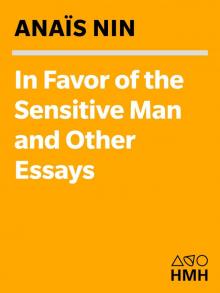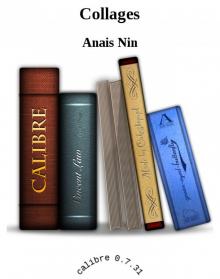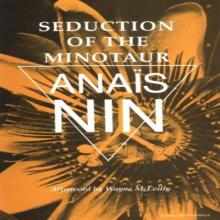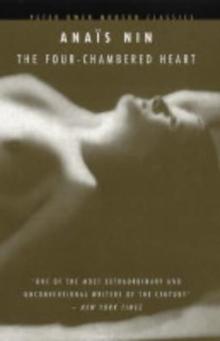A Spy in the House of Love Read online
Page 2
Alan stood at the door and what she saw first of all was his smile. He had strong, very even teeth in a long and narrow head. The smile almost closed his eyes which were narrow and shed a soft fawn light. He stood very erect with an almost military bearing, and being very tall his head bent down as if from its own weight to look down upon Sabina.
He always greeted her with a tenderness which seemed to assume she had always been in great trouble. He automatically rushed to comfort and to shelter. The way he opened his arms and the tone in which he greeted her implied: “First of all I will comfort and console you, first of all I will gather you together again, you’re always so battered by the world outside.”
The strange, continuous, almost painful tension she felt away from him always dissolved in his presence, at his very door.
He took her valise, moving with deliberate gestures, and deposited it with care in her closet. There was a rock-like center to his movements, a sense of perfect gravitation. His emotions, his thoughts revolved around a fixed center like a well-organized planetary system.
The trust she felt in his evenly modulated voice, both warm and light, in his harmonious manners never sudden or violent, in his thoughts which he weighed before articulating, in his insights which were moderate, was so great that it resembled a total abandon of herself to him, a total giving.
In trust she flowed out to him, grateful and warm.
She placed him apart from other men, distinct and unique. He held the only fixed position in the fluctuations of her feelings.
“Tired, my little one?” he said. “Was it a hard trip? Was it a success?”
He was only five years older than she was. He was thirty-five and had gray hairs on his temples, and he talked to her as if he were her father. Had he always talked in this tone to her? She tried to remember Alan as a very young man. When she was twenty years old and he twenty-five. But she could not picture him any differently than at this moment. At twenty-five he stood the same way, he spoke the same way, and even then he said: “My little one.”
For a moment, because of the caressing voice, the acceptance and the love he showed, she was tempted to say: “Alan, I am not an actress. I was not playing a part on the road. I never left New York, it was all an invention. I stayed in a hotel, with…”
She held her breath. That was what she was always doing, holding her breath so that the truth would never come out, at any time, not here with Alan, and not in the hotel room with a lover who had asked questions about Alan. She held her breath to choke the truth, made one more effort to be the very actress she denied being, to act the part she denied acting, to describe this trip she had not taken, to recreate the woman who had been away for eight days, so that the smile would not vanish from Alan’s face, so that his trustingness and happiness would not be shattered.
During the brief suspense of her breathing she was able to make the transition. It was an actress who stood before Alan now, re-enacting the past eight days.
“The trip was tiring, but the play went well. I hated the role at first, as you know. But I began to feel for Madame Bovary, and the second night I played it well, I even understood her particular kind of voice and gestures. I changed myself completely. You know how tension makes the voice higher and thinner, and nervousness increases the number of gestures?”
“What an actress you are,” said Alan. “You’re still doing it! You’ve entered into this woman’s part so thoroughly you can’t get out of it! You’re actually making so many more gestures than you ever did, and your voice has changed. Why do you keep covering your mouth with your hand? As if you were holding back something you were strongly tempted to say?”
“Yes, that is what she was doing. I must stop. I’m so tired, so tired, and I can’t stop…can’t stop being her.”
“I want my own Sabina back.”
Because Alan had said this was a part she had been playing, because he had said this was not Sabina, not the genuine one, the one he loved, Sabina began to feel that the woman who had been away eight days, who had stayed at a small hotel with a lover, who had been disturbed by the instability of that other relationship, the strangeness of it, into a mounting anxiety expressed in multiple movements, wasted, unnecessary, like the tumult of wind or water, was indeed another woman, a part she had played on the road. The valise, the impermanency, the evanescent quality of the eight days were thus explained. Nothing that had happened had any connection with Sabina herself, only with her profession. She had returned home intact, able to answer his loyalty with loyalty, his trust with trust, his single love with a single love.
“I want my own Sabina back, not this woman with a new strange gesture she had never made before, of covering her face, her mouth with her hand as if she were about to say something she did not want to say or should not say.”
He asked more questions. And now that she was moving away from the description of the role she had played into descriptions of a town, a hotel and other people in the cast, she felt this secret, this anguishing constriction tightening her heart, an invisible flush of shame, invisible to others but burning in her like a fever.
It was this shame which dressed her suddenly, permeated her gestures, clouded her beauty, her eyes with a sudden opaqueness. She experienced it as a loss of beauty, an absence of quality.
Every improvisation, every invention to Alan was always followed not by any direct knowledge of this shame, but by a substitution: almost as soon as she had talked, she felt as if her dress had faded, her eyes dimmed, she felt unlovely, unlovable, not beautiful enough, not of a quality deserving to be loved.
Why am I loved by him? Will he continue to love me? His love is for something I am not. I am not beautiful enough, I am not good, I am not good for him, he should not love me, I do not deserve it, shame shame shame for not being beautiful enough, there are other women so much more beautiful, with radiant faces and clear eyes. Alan says my eyes are beautiful, but I cannot see them, to me they are lying eyes, my mouth lies, only a few hours ago it was kissed by another… He is kissing the mouth kissed by another, he is kissing eyes which adored another…shame…shame…shame…the lies, the lies… The clothes he is hanging up for me with such care were caressed and crushed by another, the other was so impatient he crushed and tore at my dress. I had no time to undress. It is this dress he is hanging up lovingly… Can I forget yesterday, forget the vertigo, this wildness, can I come home and stay home? Sometimes I cannot bear the quick changes of scene, the quick transitions, I cannot make the changes smoothly, from one relationship to another. Some parts of me tear off like a fragment, fly here and there. I lose vital parts of myself, some part of me stays in that hotel room, a part of me is walking away from this place of haven, a part of me is following another as he walks down the street alone, or perhaps not alone: someone may take my place at his side while I am here, that will be my punishment, and someone will take my place here when I leave. I feel guilty for leaving each one alone, I feel responsible for their being alone, and I feel guilty twice over, towards both men. Wherever I am, I am in many pieces, not daring to bring them all together, anymore than I would dare to bring the two men together. Now I am here where I will not be hurt, for a few days at least I will not be hurt in any way, by any word or gesture…but I am not all of me here, only half of me is being sheltered. Well, Sabina, you failed as an actress. You rejected the discipline, the routine, the monotony, the repetitions, any sustained effort, and now you have a role which must be changed every day, to protect one human being from sorrow. Wash your lying eyes and lying face, wear the clothes which stayed in the house, which are his, baptized by his hands, play the role of a whole woman, at least you have always wished to be that, it is not altogether a lie…
Alan never understood her eagerness to take a bath, her immediate need to change her clothes, to wash off the old make up.
The pain of dislocation and division abated, the shame dissolved as Sabina passed into Alan’s mood of contentment.
At
this moment she feels impelled by a force outside of herself to be the woman he demands, desires, and creates. Whatever he says of her, about her, she will fulfill. She no longer feels responsibility for what she has been. There is a modification of her face and body, of her attitudes and her voice. She has become the woman Alan loves.
The feelings which flow through her and which carry her along are of love, protection, devotion. These feelings create a powerful current on which she floats. Because of their strength they have engulfed all her doubts, as in the case of fanatic devotions to a country, a science, an art, when all minor crimes are absolved by the unquestioned value of the aim.
A light like a small diamond facet appeared in her eyes, fixed in a narrower precision on her intent. At other times her pupils were dilated, and did not seem to focus on the present, but now their diamond precision was at work on this laborious weaving of life-giving, lies, and it gave them a clarity which was even more transparent than that of truth.
Sabina wants to be the woman whom Alan wants her to be. At times Alan is not certain of what he wishes. Then the stormy, tumultuous Sabina waits in incredible stillness, alert and watchful for signs of his wishes and fantasies.
The new self she offered him: created for him, appeared intensely innocent, newer than any young girl could have been, because it was like a pure abstraction of a woman, an idealized figure, not born of what she was, but of his wish and hers. She even altered her rhythm for him, surrendered her heavy restless gestures, her liking for large objects, large rooms, for timelessness, for caprice and sudden actions. Even her hands which were sturdy, for his sake rested more gently upon objects around her.
“You always wanted to be an actress, Sabina. It makes me happy that you’re fulfilling this wish. It consoles me for your absences.”
For his pleasure she began to reconstruct the events of the last week of her absence: the trip to Provincetown, the behavior of the cast, the problems in the play, directing errors, the reactions of the public, the night when the fuses burnt out, the night when the sound track broke down.
At the same time she wished she could tell him what had actually happened; she wished she could rest her head upon his shoulder as upon a protective force, a protective understanding not concerned with possession of her but a complete knowledge of her which would include absolution. Wishing he might judge her acts with the same detachment and wisdom he applied to others’ acts, wishing he might absolve her as he absolved strangers from a knowledge of their motivations.
Above all she wished for his absolution so that she might sleep deeply. She knew what awaited her instead of sleep: an anxious watch in the night. For after she had reconstructed the events of the last week for Alan’s peace of mind, after he had kissed her with gratitude, and with a hunger accumulated during her absence, he fell into a deep sleep in utter abandon and confidence in the night which had brought Sabina back, while Sabina lay awake wondering whether among her inventions there might be one which could be exposed later, wondering whether her description of the Provincetown hotel might be proved false, being based on hearsay. Wondering whether she would remember what she had said about it, and what she had said about the other members of the cast. Wondering if Alan might meet one of the actors in the cast some day and discover Sabina had never worked with them at all.
The night came merely as a dark stage upon which invented scenes took on a greater sharpness than by day. Scenes surrounded by darkness were like the scenes in a dream, heightened, delineated intensely, and all the while suggesting the abysses surrounding the circles of light.
Outside of this room, this bed, there was a black precipice. She had escaped danger for a day, that was all. Other dangers awaited her tomorrow.
At night too she puzzled over the mystery of her desperate need of kindness. As other girls prayed for handsomeness in a lover, or for wealth, or for power, or for poetry, she had prayed fervently: let him be kind.
Why should she have had such a need of kindness? Was she a cripple? What if instead she had married aan of violence or a man of cruelty?
At the mere word “cruelty” her heart started to beat feverishly. The enormity of the dangers she had averted was so great she did not even dare picture them. She had desired and obtained kindness. And now that she had found it she risked its loss every day, every hour, on other quests!
Alan slept so peacefully. Even in sleep he maintained a serenity of gesture. The firm design of his nose, mouth and chin, the angular lines of the body, all sculptured from some material of rectitude that would not slacken. In moments of desire even, he did not have the wildness of the eyes, disordered hair of others. He would never grow almost delirious with pleasure or utter sounds not quite human, from the jungle of man’s earlier animalism.
Was it this quietism that inspired her trust? He told no lies. What he felt and thought he could tell Sabina. At the thought of confession, of confiding in him, she was almost asleep when out of the darkness the image of Alan appeared vividly and he was sobbing, sobbing desperately as he had at his father’s death. This image awakened her with horror, with compassion, and again her feeling was: I must always be on guard, to protect his happiness, always on guard to protect my guardian angel…
In the darkness she relived entirely the eight days spent in Provincetown.
She had walked into the dunes in quest of O’Neill’s house, and had lost her way. The sand dunes were so white in the sun, so immaculate, that she felt like the first inhabitant at the top of a glacier.
The sea churned at the base as if struggling to drag back the sand into its depths, carrying a little away each time only to replace it at high tide in the form of geological designs, a static sea of crystallized sand waves.
There she stopped and took off her bathing suit to lie in the sun. Drifts of sand were lifted by the wind and deposited over her skin like muslin. She wondered whether if she stayed there long enough it would cover her, and would she disappear in a natural tomb. Immobility always brought this image to her, the image of death, and it was this which impelled her to rise and seek activity. Repose, to her, resembled death.
But here in this moment of warmth and light with her face towards the sky, the sea coiling and uncoiling violently at her feet, she did not fear the image of death. She lay still watching the wind forming sand drawings and felt a momentary suspense from anxiety and fever. Happiness had been defined once as the absence of fever. Then what was it she possessed which was the opposite of fever?
She was grateful that, hypnotized by the sun’s reassuring splendor and the sea’s incurable restlessness, her own nerves did not coil and spring within her to destroy this moment of repose.
It was at this moment that she heard a song. It was not a casual song anyone might sing walking along the beach. It was a powerful, developed voice with a firm core of gravity, accustomed to vast halls and a large public. Neither the sand nor wind nor sea nor space could attenuate it. It was flung out with assurance, in defiane of them all, a vital hymn of strength equal to the elements.
The man who appeared had a body which was a full match to his voice, a perfect case for this instrument. He had a strong neck, a large head with high brow, wide shoulders and long legs. A full strong box for the vocal cords, good for resonance, thought Sabina, who had not moved, hoping he would walk by without seeing her and without interrupting this song from Tristan and Isolde.
As the song continued she found herself in the Black Forest of the German fairy tales which she had read so avidly in her childhood. Giant trees, castles, horsemen, all out of proportion in a child’s eyes.
The song ascended, swelled, gathered together all the turmoil of the sea, the rutilant gold carnival of the sun, rivaled the wind and flung its highest notes into space like the bridge span of a flamboyant rainbow. And then the incantation broke.
He had seen Sabina.
He hesitated.
Her silence as perfectly eloquent as his song, her immobility as flowing an essence of he
r meaning as his voice had been.
(Later he told her: “If you had spoken then I would have walked away. You had the talent of letting everything else speak for you. It was because you were silent that I came up to you.”)
She allowed him to continue his dream.
She watched him walk freely and easily up the sand dune, smiling. His eyes took their color from the sea. A moment ago she had seen the sea as a million diamond eyes and now only two, bluer, colder, approached her. If the sea and the sand and the sun had formed a man to incarnate the joyousness of the afternoon they would have spouted a man like this.
He stood before her, blocking the sun, still smiling as she covered herself. The silence continued to transmit messages between them.
“Tristan and Isolde sounded more beautiful here than at the Opera,” she said, and donned her bathing suit and her necklace quietly, as if this were the end of a performance of his voice and her body.
He sat down beside her. “There is only one place where it sounds better: the Black Forest itself, where the song was born.”
By his accent she knew that he came from there, and that his physical resemblance to the Wagnerian hero was not accidental.
“I sang it there very often. There’s an echo there, and I had the feeling the song was being preserved in hidden sources and that it will spring up again long after I am dead.”
Sabina seemed to be listening to the echo of his song, and of his description of a place where there was memory, where the past itself was like a vast echo retaining experience; whereas here there was this great determination to pose of memories and to live only in the present, as if memory were but a cumbersome baggage. That was what he meant, and Sabina understood.
Then her tidal movement caught her again, and she said impatiently: “Let’s walk.”
“I’m thirsty,” he said. “Let’s walk back to where I was sitting. I left a bag of oranges.”
They descended the sand dunes sliding as if it were a hill of snow and they had been on skis. They walked along the wet sand.

 Diary of Anais Nin, Volume 5
Diary of Anais Nin, Volume 5 A Spy in the House of Love
A Spy in the House of Love In Favor of the Sensitive Man and Other Essays (Original Harvest Book; Hb333)
In Favor of the Sensitive Man and Other Essays (Original Harvest Book; Hb333) Collages
Collages Seduction of the Minotaur
Seduction of the Minotaur Children of the Albatross
Children of the Albatross Delta of Venus
Delta of Venus The Four-Chambered Heart coti-3
The Four-Chambered Heart coti-3 Diary of Anais Nin, Volume 2
Diary of Anais Nin, Volume 2 Diary of Anais Nin, Volume 1
Diary of Anais Nin, Volume 1 Diary of Anais Nin, Volume 4
Diary of Anais Nin, Volume 4 The Winter of Artifice
The Winter of Artifice Seduction of the Minotaur coti-5
Seduction of the Minotaur coti-5 Children of the Albatross coti-2
Children of the Albatross coti-2 Henry and June: From A Journal of Love -The Unexpurgated Diary of Anaïs Nin (1931-1932)
Henry and June: From A Journal of Love -The Unexpurgated Diary of Anaïs Nin (1931-1932) Ladders to Fire
Ladders to Fire House of Incest
House of Incest